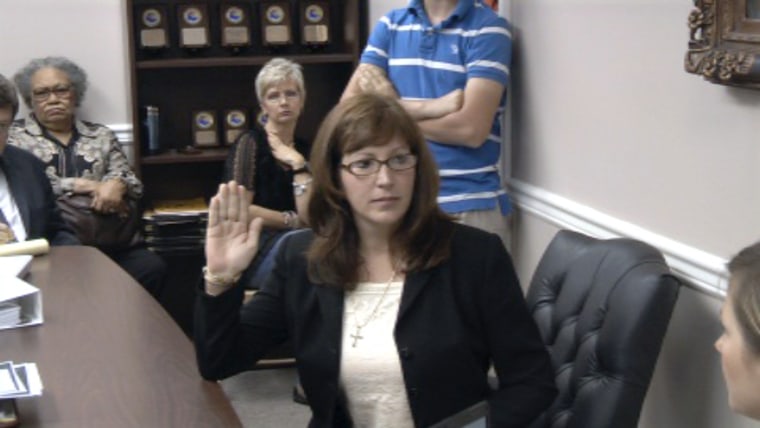There’s a certain level of trust between a parent and a school. But what happens when your child's teacher does something really bizarre?
Corporal punishment remains an option in 20 states, according to a recent report, and is still debated by lawmakers every year. But a slew of recent tales of teachers losing control — and enacting strange and sometimes violent punishments on students — has put alarmed parents on high alert.
At the elementary level, educators have been accused of meting out unusual psychological punishments. In Mississippi, a second-grader was sent to the office of principal Leigh Todd for talking back to a teacher and sticking his tongue out at her. His alleged punishment? To sit in a chair in Todd’s office with his tongue sticking out for an extended period of time, a situation the superintendent called “abuse.”
A co-worker in a Tennessee school reported that teacher Debbie Hayes, a 38-year classroom veteran, encouraged students to circle around a child, oink at him and call him a pig because his “spot” was messy. Hayes was suspended, and her actions were called “a black eye on the profession” by the county school system’s director.

Nashville high school algebra teacher Donald Brian Wood had what was characterized as a “little bit of a nervous breakdown.” While attempting to calm a class that wouldn’t listen, he started yelling and scattering papers, hurled a desk and broke a window. In a video that went viral online, panicked students fled the room, and Wood was placed on administrative leave.
And just this week, a high school teacher in Hawaii allegedly threw a hammer at a student, resulting in four staples in the child’s head. “I could be going to a funeral instead of a graduation this year,” the teen’s dad told Honolulu’s KITV. “Thank god he wasn’t seriously injured.”
No teacher will argue the fact that theirs is often a tough job. “It’s infuriating at times,” said Jennifer Warrick, a first-grade teacher and reading specialist in suburban Chicago. “I’ve had kids — first-graders — yelling and swearing at me in the middle of the classroom. You sometimes have to take a deep breath and remove yourself from the situation.”
Nevertheless, taking it out on the kids themselves is not the answer. So how are educators meant to deal with the frustrations that inevitably arise? Experts believe educators should look within. “Teachers are professionals, and they need to learn how to deal with themselves before they deal with kids,” said Barbara Kaiser, co-author of “Challenging Behavior in Young Children: Understanding, Preventing, and Responding Effectively.” “Daniel Goleman (who wrote the 1996 book “Emotional Intelligence”) called it an ‘amygdala hijack.’ When you’re faced with certain stimuli, instead of it going to the thinking part of your brain — your neocortex — it immediately goes to your amygdala and you respond in very unthoughtful, sometimes harmful ways.”
Kaiser, naturally, does not excuse this type of reaction. “Teachers should be teaching, not punishing. What teachers need to recognize is that when you punish one child, all the other kids are watching. They’re role-modeling the use of power on an unequal plane. We then wonder why we have bullying in schools.”
So what may be prompting kids to behave badly in the first place, and how should teachers react?
Kaiser explained that kids use behavior to send a message. “It’s usually to escape something because it’s too difficult or they don’t like to do it,” she said, citing homework as a big culprit. “So many kids come to school having already failed before they even enter the classroom. And the best way to hide that is to be asked to leave the classroom. And the best way to leave the classroom is through behavior. So it’s a really vicious cycle.”
Standard punishments in schools these days, said Warrick, include revocation of privileges or “isolation from the rest of the class.” But Kaiser believes prevention should be the first priority. Meeting children at the door and assessing their moods when they walk in takes little extra effort, and Kaiser said that forming relationships with children will pay off in good behavior because the teacher then understands what the child needs.
“What I always say to teachers is, ‘If what you’re doing isn’t changing the behavior of that student, then what you’re doing isn’t working.’ ”